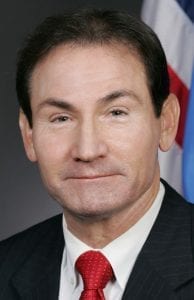BY RON SHARP
 I was disappointed when my HB 1953 wasn’t approved this week. It would’ve allowed state agencies to voluntarily pay their employees for up to 200 hours of their annual leave as long as they had 120 hours remaining. Members of the Oklahoma Public Employees Association [OPEA] requested it so employees would stop losing their hard-earned vacation leave with no recourse or compensation.
I was disappointed when my HB 1953 wasn’t approved this week. It would’ve allowed state agencies to voluntarily pay their employees for up to 200 hours of their annual leave as long as they had 120 hours remaining. Members of the Oklahoma Public Employees Association [OPEA] requested it so employees would stop losing their hard-earned vacation leave with no recourse or compensation.
Oklahoma has approximately 32,500 state employees working year-round in our hospitals, nursing homes and prisons as well as on our streets and in other areas to provide the many state services we depending on daily.
During the last decade our state and nation faced difficult economic times leading to multiple revenue shortfalls, which required drastic state agency budget cuts. The Legislature had to cut 85% of the agencies’ budgets by 45% during that time to balance the annual budgets. The Legislature can’t spend more money than the state brings in annually; and if there’s a shortfall, it must be filled before the next budget is started.
State agencies were forced to cut their staffs by as much as 20%-30%. More than 7,000 jobs were cut and 18 agencies were consolidated or eliminated putting more work on the remaining employees. Many have been forced to do the jobs of three-four people, which requires working 40-plus hour weeks, weekends and sometimes holidays. They either aren’t able or allowed to take off work because of the staff shortages and excessive workloads.
For example, the Department of Corrections [DOC] is at a 60% staffing level for correctional officers in our prisons [that are at over 103% capacity]. They’re currently working 60-80 hours per week and aren’t being allowed to take off because there aren’t enough guards.
Fortunately, these officers may get a $2 an hour raise this year, which might help attract more applicants and lower turnover rates. But the agency needs additional funding to hire more guards so these individuals can return to 40-hour working weeks.
Since it appears the state employees pay raise may be killed, HB 1953 was desperately needed to boost morale, slow costly turnover rates and provide some form of additional compensation, but it died in the Senate 24-18 [a list of No votes can be found here.]
Our state employees are overworked and underpaid. Some state employees qualify for government assistance and others with multiple degrees work a second and third job to make ends meet. These public servants have dedicated their lives to helping the state, and this is how they’re treated? They’re being taken advantage of and their annual leave is being stolen from them.
Last year, they got their first across-the-board raise in nine years [a tiered raise ranging from $750-$2,000] – a drop in the bucket compared to their ever-increasing health insurance costs and living expenses [gas, food, medical, utilities, etc.] Unlike employees in other sectors, state employees also don’t get an annual cost-of-living bump in their pay.
State employees can only carry up to 480 hours of annual leave each year. Some agencies require that anything above that amount be used up monthly while others require it be used by Dec. 31. Given the high workloads and staff shortages, many employees aren’t being allowed to use their annual leave so they’re going over the limit and losing their hard-earned vacation time.
Currently, state employees only get paid for their annual leave when they quit or retire.
My colleagues were confused and voted against the bill arguing it’ll have a fiscal impact. But both the Office of Management and Enterprise Services [OMES] and OPEA verified that HB 1953 has no revenue impact because agencies are legally required to budget for these funds. They must be prepared to pay an employee for their annual leave at any point should they quit or retire.
Opponents also didn’t understand how it could save agencies money. Again, OMES and OPEA verified that it could provide some cost savings. It’s cheaper to pay for portions of someone’s annual leave periodically throughout their career when their salary is lower than waiting until the end of their career when their salary is the highest.
This is also a matter of basic decency – these people have earned this time and it’s just being stolen from them. Our state employees deserve better.
– Shawnee Republican Ron Sharp represents District 17 in the Oklahoma Senate








